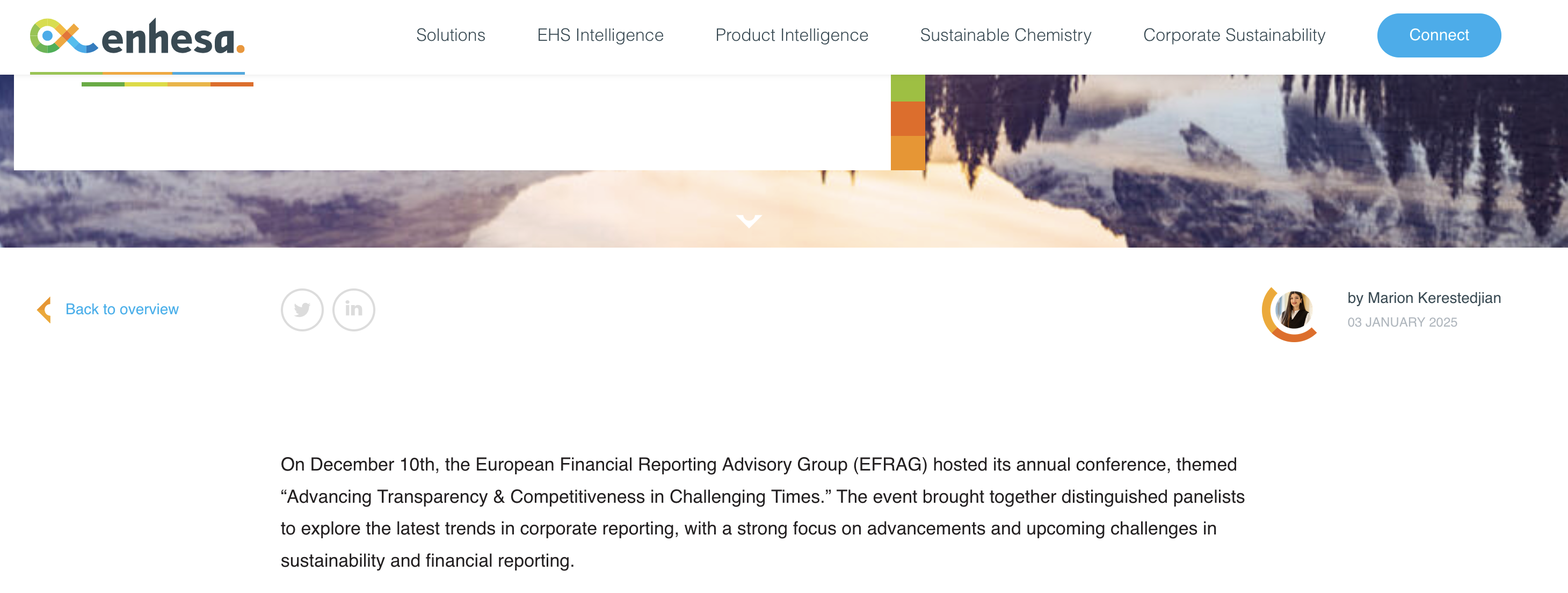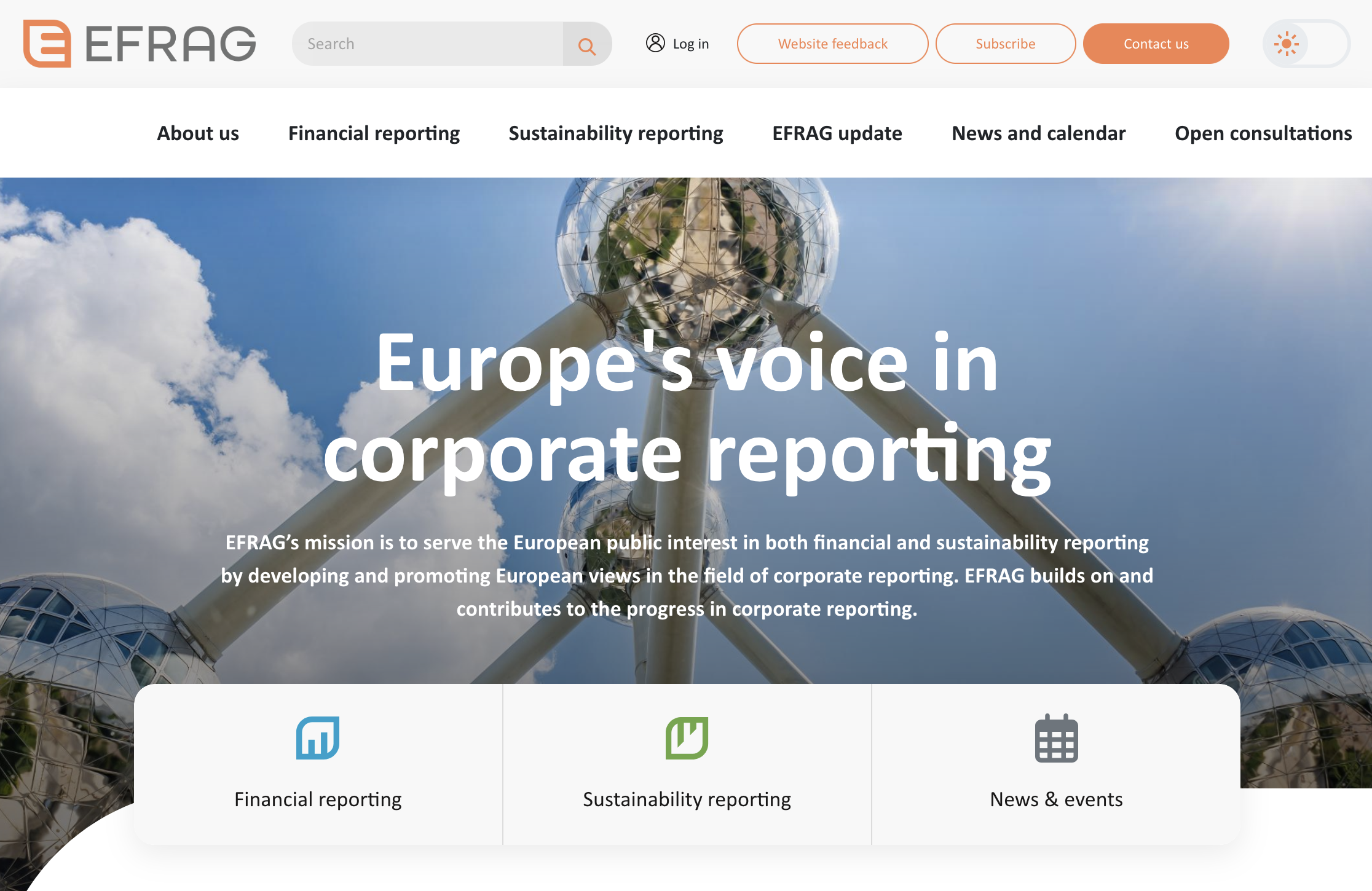Act
EFRAG Sustainability Financial Reporting Roadmap 2025

Tool
Description
How this helps foster open ecosystems
Why we recommend
Marion Kerestedjian shares key insights on the EFRAG Annual Conference, outlining key regulations and frameworks that will impact on corporate sustainability and financial reporting. Regulations and frameworks that are currently being mapped and aligned by EFRAG include:
- Corporate Sustainability Reporting Directive (CSRD)
- Voluntary sustainability reporting standards for Small and Medium Enterprises (VSME) published by EFRAG in late 2024
- International Financial Reporting Standards (IFRS) and other standards of the the International Sustainability Standards Board (endorsed by the International Organization of Securities Commissions, IOSCO)
- International Ethics Standards Board for Accountants (IESBA)
- Growth and Emerging Markets Committee Network for Adoption or Use of Other ISSB Standards
- EFRAG Implementation Guidance for Global Reporting Initiative (GRI)
- Taskforce on Nature-related Financial Disclosures
- Carbon Disclosure Project
- European Sustainability Reporting Standards (ESRS)
- non-EU Group Reporting Standards (NESRS).
The article describes several trends and areas where work needs to focus in 2025 to support supply chain actors in sustainability financial reporting. Kerestedjian describes key challenges and work areas that are required:
- Modernisation of outdated standards, highlighting the need in particular to address "intangible assets" which she says "no longer reflect today's business environment"
- Collaborative efforts, along the lines that we tend to propose as part of a coordination relationship within an open ecosystem
- IOSCO has set goals of corporate adoption of financial reporting standards (aiming for 130,000 companies to adopt sustainability reporting)
- Efforts by EFRAG to lead interoperability across the various standards for sustainability financial reporting, with human rights and nature-related issues in reporting expected to be "a primary focus in coming months"
- Alignment between global and regional reporting standards (with non-EU sustainability reporting standards submitted by end of 2025 to the European Commission, mostly focused on "impact materiality")
- Encouragement of voluntary reporting and phase-in reporting to reduce the compliance burden on companies, especially for Small and Medium Enterprises
- Need for increased capacity-building initiatives to support global adoption of sustainability reporting standards
- Encouragement of sector-specific standards (which aren't expected to be regulatory requirements until 2027 or 2028)
- Digitalisation of reporting systems to enhance efficiency
- Because of the complexities and greater need for data and digital systems, Kerestedjian notes growing interest in AI for financial reporting, although noting that "the human element remains vital" to enabling transparency and that reporting is understandable.
2025 is expected to find a middle way between fostering an "urgency for progress with the time needed to build consensus".
This is the second piece we have read recently that raises emerging risks to Europe's Corporate Sustainability Reporting Directive (CSRD), where a potential omnibus aimed at reducing regulatory requirements are being proposed (The Corporate Europe Observatory also warned that enterprise lobbyists were pushing for simplification of CSRD requirements as a mechanism for "competitiveness" but which risk reducing the regulatory oversight outlined by the CSRD). While Kerestedjian recognises that there are complexities within the CSRD, she recommends that these be addressed through a holistic review, focusing on the underlying interoperability, standardisation and leveraging technologies rather than watering down requirements which would also introduce greater uncertainty. In fact, she notes the challenges in doing so as an omnibus bill would require "a clear working majority" of European member states, and, more importantly, that there was significant market demand for sustainability financial reporting, with the business sector itself called for reporting to enable transparency, reduce business material risks, and encourage new investments.
The article helps to quickly understand the current work program not just of EFRAG but other standards and financial accounting bodies and their coordinated efforts to simplify standards and encourage interoperability. At Platformable, we are seeing this type of coordination and ecosystem leadership emerging in a number of sectors: interoperability for countries (and at regional level, like at the EU-level) is a high priority in health and banking/finance at the moment, while there are a number of global initiatives being led by multilateral organisations working in supply chain traceability aimed at reducing complexity through supporting greater interoperability. We see interoperability as a key theme being addressed in open ecosystems for at least the first half 2025.
And while Kerestedjian points to the need for a consideration by stakeholders on how AI can aid in all of this work program, we would caution that the best place to start would be with APIs. After all, AI won't be possible without APIs, and in our analysis of global work in creating APIs for financial accounting and sustainability, we would say that to date, the APIs being created are poorly made and do not reflect industry API best practices. The most recent example is the API built by the European Commission for bulk uploads to their European Union Deforestation Regulation (EUDR) Information System. Their API is a masterclass in what not to do when publishing an API: a clear lack of developer engagement in design and building the API, poor documentation, no API specification file, and a lack of developer portal resources.
APIs can support interoperable data exchange at scale and can assist in making common data models and shared standards machine readable. With well designed APIs in place, it is possible to then enhance systems with AI and other emergent technologies tooling, such as trust frameworks and secure data environments that enable data to be shared in secure ways with specific entities, which will also be a growing need in a sustainability financial reporting digital ecosystem.
We highly recommend reading Kerestedjian's article in full, and we will be digging into the keynotes and other documents from EFRAG's annual conference as we continue to build out our traceability work for 2025, which will include a focus on sustainable financial reporting regulations.

Mark Boyd
DIRECTORmark@platformable.com

